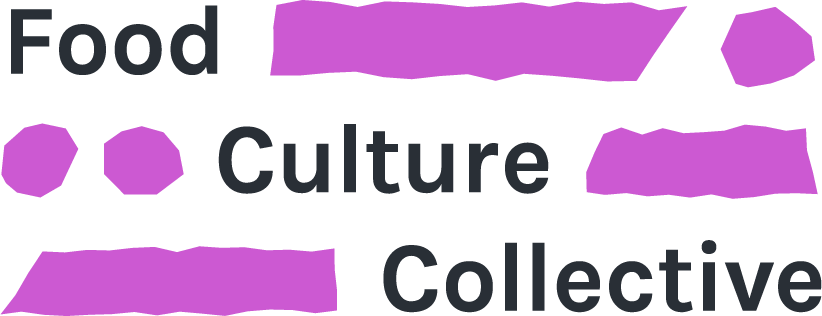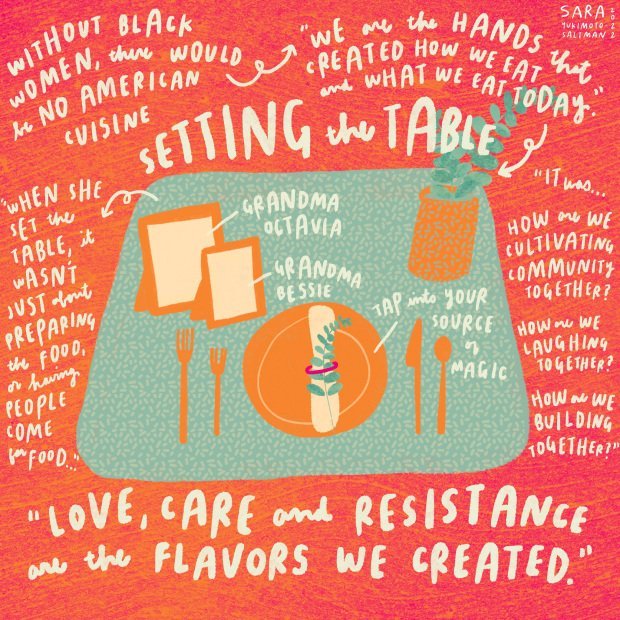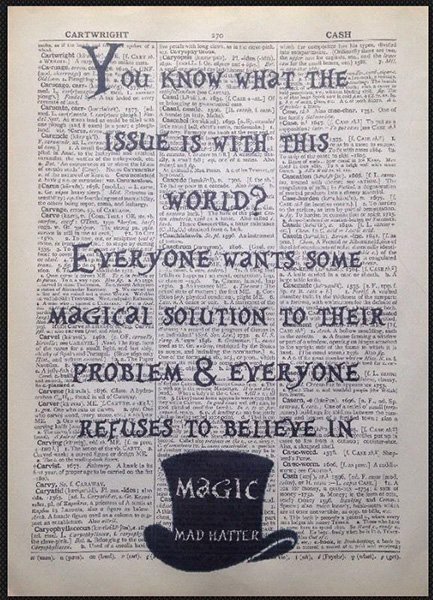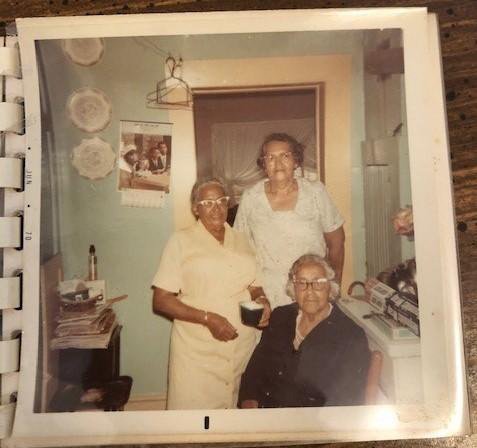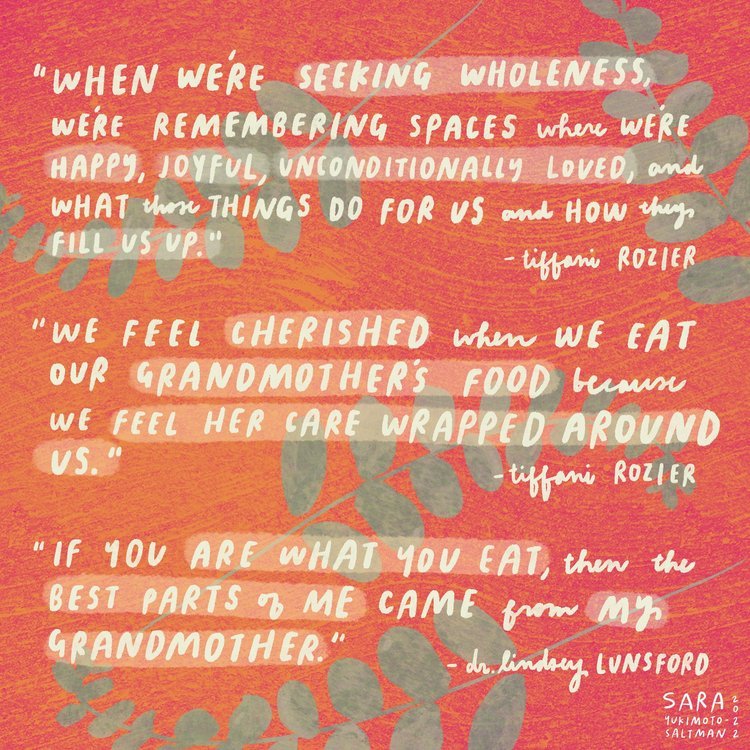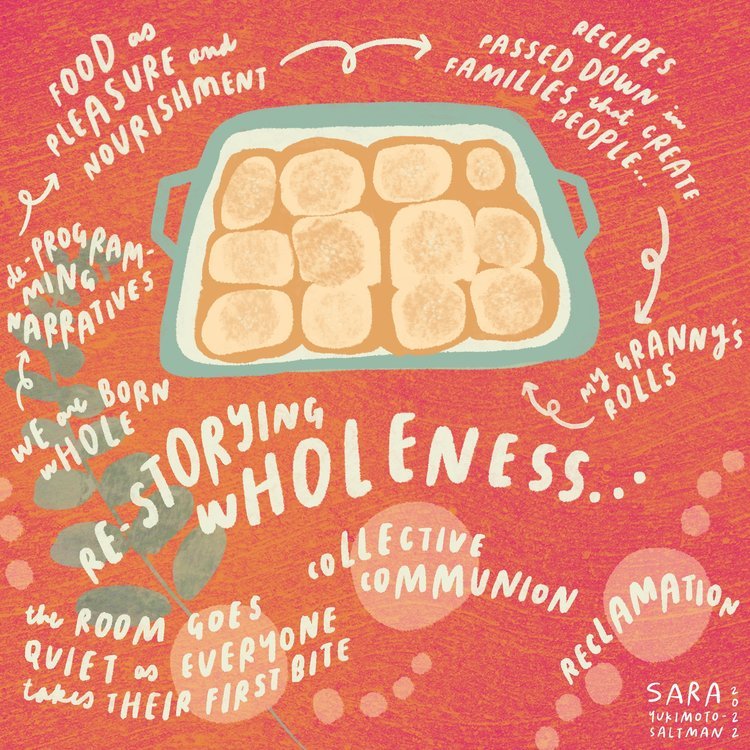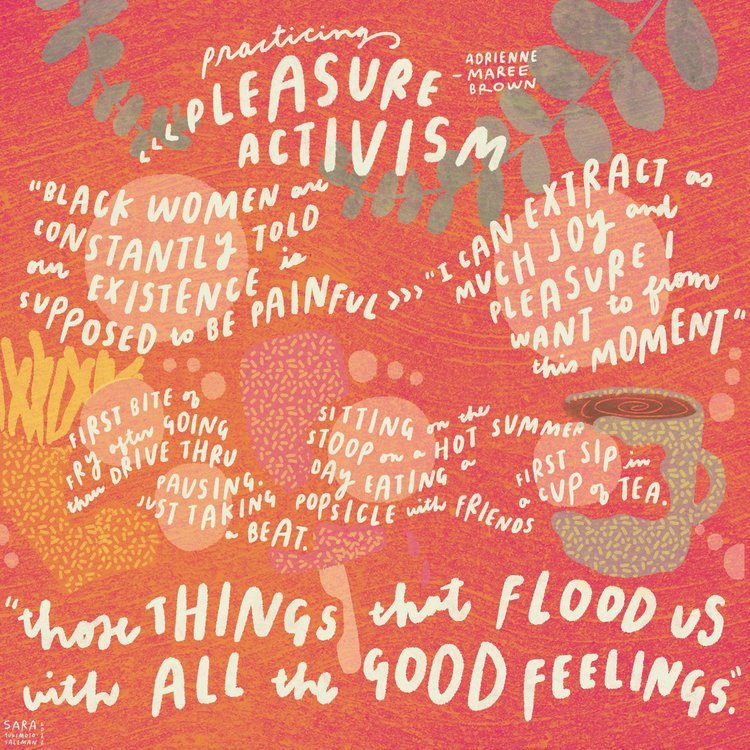Can our food narratives feed our wholeness and joy?
BY ADA CUADRADO-MEDINA
Around the Table: Narratives of Wholeness with Lindsey Lunsford and Tiffani Rozier in Conversation with Stefani Renée Medley
Our Around The Table series features informal conversations between food workers, thought leaders, elders, organizers, and creatives. Together, we take a deep dive—sinking our teeth into the juicy stories, live questions, and critical conversations buzzing in the food and culture space.
What is wholeness? And how do we lift up food narratives that feed our wholeness in ways that nourish us deeply and witness us in the fullness of our impact? What can we learn from the storied lineage of Black food changemakers about leading with wholeness, care and joy to transform our shared food culture?
These were the questions RFRS Advisory Board Member and creator of the food and lifestyle blog Savor & Sage, Stefani Renée Medley, brought to the table in a virtual conversation held on April 14th with Black food scholar activist, Lindsey Lunsford and food writer and host of Afros & Knives, Tiffani Rozier. They joined over 100 guests around the virtual table for a juicy and truly nourishing conversation that challenged harmful mainstream narratives around Black womanhood and food.
Together, they considered how centering stories and experiences of love and happiness around food can heal, and connect us to our individual and collective wholeness. They braided threads from “rediscovering” wholeness in moments of everyday joy and reclaiming her grandmother’s soul food kitchen, to pleasure activism in practice and re-storying Black foodways to transform food culture.
What follows are some highlights and audio excerpts from this wide-ranging conversation, as well as some thought-weaving. You can read and listen through the whole piece, or pick and choose based on the questions you’re most drawn to. This was a rich hour-long conversation and we encourage you to tune in to the conversation in its entirety by watching the video embedded below.
Some quotes have been edited for length and clarity. To view the full, unedited transcript of the conversation with Lindsey, Rowen, and Stefani Renée, click here. All graphic recording illustrations by Sara Yukimo-Saltman
But first, let’s set the table.
Before diving into conversation, we always ask our guests to help us “set the table.” Given the virtual setting, this practice allows us to be intentional about how we set the context for these juicy and generative conversations, inviting us to bring our whole selves to the table and share an offering with the community.
As we gathered around, Stefani Renée invited the community to reflect on the deeper ways that we cultivate community at the table and offered questions for reflection inspired by family gatherings around her grandmother Octavia’s table: How are we cultivating community together? How are we laughing together? How are we building together?
Tiffani shared a favorite quote, inviting us to embrace each other in our “muchness,” while Lindsey shared a family photo along with an original spoken word poem, reminding us that rooting in our wholeness and joy is an act of radical reclamation .
TIFFANI: One of my favorite books about self and about wholeness is Alice in Wonderland. The story of Alice is that a lot of the things happening in her physical reality are not things she's vibing with at this point. So her adventure down the rabbit hole is really her facing herself and figuring out the world she wants to live in, which direction she wants to go .
…There's something in us all that’s a bit magical—we forget to apply that. We're conditioned to believe there's nothing magical about the world anymore, and that life is essentially supposed to be an ongoing struggle and small little triumphs and nothing magical about it…I'm offering this to the conversation: tap into your own source of magic. And I think of that magic, how Alice in Wonderland uses the word “muchness”, where muchness is a reference to who you are. So, I invite you to bring your own muchness and magic into the conversation.
Lindsey opened with an old family photo that was almost thrown away, picturing her grandmother, great aunt, and great grandmother in her grandmother’s kitchen in 1970. She shared parallels between how easy it is to lose family treasures, like this photo, the fragility of the storied lineage of Black food and traditions, and the power found in reclaiming the narratives that shape our memories.
LINDSEY: My grandmother's kitchen and so many grandmother's kitchens are a site of not only joy, but also accusation. My grandmother got blamed for a lot, I feel. So, this poem is a reclamation of my grandma's kitchen.
Lindsey Lunsford’s grandmother, great aunt, and great grandmother in her grandmother’s kitchen, 1970.
Soul food vs. “whole” food
When I was little, they said, no to soul food.
Told me I was better off with Whole Foods.
Then I went to Whole Foods. And saw collards, kale, and oxtails.
Seems like someone told Whole Foods about soul food.
And now it's a sold food.
System's so rude,
Tell you granny's cooking was all bad
And turn around and ask you,
“Have you discovered the wonders of butter?”
Or “Hoppin’ John is all the rage.”
They want you to forget pork belly was once the food of the slave.
Taking our ancestors’ recipes got 'em rolling in their grave.
We been eating grits,
But now they're popular
Because some 5-star chefs acknowledge it.
Food gentrification—they been gettin’ rich.
Off the same food we are now taught to resist.
But I still can’t eat watermelon in public.
And then show you how you're loving it,
Because strange food carries stigma.
It's a shame because it's so good.
Or, is it just that you can't enjoy it the same?
Or should I say we can't enjoy it the same?
They want us to believe all this diabetes, hypertension
Came out of Big Mama's kitchen
And not as a direct result of an equally broken health care and justice system.
Like being Black never meant being stressed.
Like praying isn’t the only reason our food was blessed.
If they ain't mad at Colonel Sanders, don't be mad at my Grandma Bessy.
‘Cause at least she cooked her own chicken.
Love, care, and resistance are the flavors you created.
So you can keep your food whole.
You can keep your Whole Foods.
As long as we can keep our food’s soul.
As long as we can keep our soul food.
What does wholeness mean to you?
Both Lindsey and Tiffani address food narratives—about the Black community and Black women in particular—in their work. From academia to food media, they are challenging harmful stories our dominant food culture perpetuates and helping us all to recognize how crucial it is to feed narratives that nourish us all and feed our collective transformation.
But talking about narratives of wholeness can feel difficult to wrap our minds around– where do we begin? How do we ground ourselves? Stefani started us off with the question, “What does wholeness mean for you, and what food narratives feed you in your wholeness?”
From the unfiltered joy of eating the first hot fry out of the bag to remembering the foods that made us, Lindsey and Tiffani remind us that some of the most powerful experiences of wholeness and connection can come from the nourishment food offers that goes far beyond sustenance.
TIFFANI: Wholeness is not something you have to go get, but something you have to rediscover about yourself. We come into the world whole. Life and people and society, and other internal or external stories, you know, kind of pick us apart, and reshape what we believe about ourselves. Wholeness is actually remembering who you are, not so much trying to figure out who you are.
It’s more about you remembering, “I came into the world with what I needed and complete as who I was.”
Wholeness for me looks like—you know when you're on your way home, you're hungry, you ain't fit to cook nothing when you get home. You pull through a drive thru—I don't care which drive thru, it's up to you—and before you even get to the street again, you reach your hand in the bag, and reach for the potatoes that are perfectly seasoned and hot and steamy. There’s a moment when you bite into that first potato—it's a fry, whether it's waffle or whatever— and everything in the world is right all of a sudden. Your entire body's in alignment again. You’re not hungry anymore, your brain isn’t focused on eating, but just pleasure and enjoyment. That's wholeness—that’s you remembering you came with everything and your body and your mind are just in perfect alignment in that one moment. Even when you’re about to pull on to traffic, and there’s some foolishness on the street— but that one moment with that single fry, where you can't even make it home before you get that bite in—everything about that moment for me, resonates with wholeness.
Wholeness isn’t just something we have individually, it is something we also have collectively. Tiffani invites us to remember and savor these moments of community wholeness and communion.
TIFFANI: You know [when], Grandmamaw, or your auntie, put something on the table and the table is full of the love that someone put into a dish? And then everyone's plates are prepared, and the grace has been said by somebody's uncle who took 20 minutes. All of a sudden, everyone gets a bite in, and the room or building, or house, the backyard—wherever you're eating together—falls silent. There’s this moment of collective communion and quiet. Because all you hear is people chewing, and forks hitting the plate— that's a moment of community wholeness.
Now, we're all here together, having that same collective moment, that first bite into, you know, a rib or potato salad. Everyone's like, “yeah,” a collective agreement, “We're all here for this moment”.
So that's another reminder not just of individual wholeness, but community wholeness. We already have what we need, and we already are here in completeness. There aren't any pieces missing from us.
Lindsey offers another way into wholeness through uncovering the the stories around food and people that connect us. She shares her approach to finding these food stories in both her life and work.
LINDSEY: A lot about my favorite food stories that feed me are origin stories. How did I get here? What came to be? What came to pass?
I say, "If you are what you eat, then the best parts of me came from my grandmother." The best things I ever tasted! And knowing I’ll never taste them again because she’s gone. Other people can try, but they'll never do it like that. I don't think the flour is the same, like it was in the early 90’s.
Food also encompasses gathering. Things you remember the most, my childhood memories, are when people were gathered, when most joy was felt, and food was there.
And I also think about how they used to say in the old days, "Food is the way to a man's stomach."
Or the way to a significant other's stomach. Some of us got here because their foreparents were really great at cooking ribs. He had that rib plate. And that lady said, “This is going to be my spouse, and I shall have a family with him.”
So I think about those recipes passed down in the family that helped create people. I think about food and people's origin stories. What meals did people make that brought people together?
What really touches me, what I ask students to write out is: “What is your family food story? What is your story around food?”
I want to know how food impacts people. So that would be the wholeness—if you can tell me the food that brought people together. For me, my grandma is infamous for her rolls. I feel like that's a part of why I'm here today as well.
How do you reweave the threads that connect us to wholeness through your work?
In sharing how her work in food media was sparked from a calling to center the stories of Black women in food, Tiffani points to moments of happiness around food, and why it is so important to focus on joy and pleasure—not just narratives of resilience and grief—in our lives.
TIFFANI: With Afros and Knives, when I started initially, I didn't know anyone who looked like me. In regular media, I’d watch hours of Food Network, and maybe see two Black women.
I know we’ve been feeding the country since the beginning of time, so I don’t understand why we are not out here and our stories aren't being told, for real? Without Black women, there wouldn't be American cuisine. So, I mean, you can argue with the wall about that, but that's just the truth. So, you know, we essentially are the hands that created how we eat and what we eat in this country today. We were missing from the story of it and how the story's being told, and how the global understanding of American cooking works.
So I just personally was like, “I need to find a collection of women who look like me, who maybe have similar experiences or share an understanding of food in the way I do…where are we?”I'm less interested in seeing this person trying to cook pork belly nine different ways— I want to hear about somebody’s grandmama's biscuits. Can we create a space for that?
…[W]e are so busy working towards our healing and getting these things together, and all this other stuff, we forget that the purpose of that is for us to find our way back to those spaces of joy. That moment where you are, you know, sitting on the stoop with your friends on a hot summer day and having a popsicle. Where's that feeling at? That feeling died somewhere, and we’re trying to get back to it. But as adults, we take it so seriously that we forget that the feeling we're trying to get back to is just a bag of Funyuns and soda. We're trying to get back to that.
For me, Afros and Knives and Set the Table is about getting back to that space of a tremendous amount of unconditional joy, and what we love about gathering and putting the focus squarely there. How can we provoke curiosity and pleasure in the foods that we so dearly love, and allow that to also play in the story we are telling about who we are?
What is the storied lineage of food justice and healing for you?
Calling on the long tradition of centering storytelling and narrative work in Black scholarship—including Psyche Williams‑Forson’s work on cultivating Black food energy for cultural sustainability and Vertamae Smart‑Grosvenor’s articulation of vibration cooking—Stefani Renèe asked Lindsey to share the stories and storytellers that have informed her work in shaping our narratives of food justice and healing.
Without missing a beat, Lindsey stood up to pull a whole summer reading list from her bookshelf, walking us through the storied lineage of Black scholarship around food.
Lindsey Lunsford’s Black Food Stories Summer Reading List
(In order of mention)
Harris, Jessica B. High on the Hog: A Culinary Journey from Africa to America. New York: Bloomsbury, 2011. Print.
High on the Hog: How African American Cuisine Transformed America. Directed by Roger Ross Williams, Jonathan Clasberry, and Yoruba Richen, performance by Stephen Satterfield, Adrian Miller, Michael Twitty, and Jessica B. Harris. Netflix Studios, One Story Up Productions, and Pilgrim Media Group, 2021. Netflix.
Palmer, Zella. Recipes and Remembrances of Fair Dillard: 1869-2019. University of Louisiana at Lafayette Press, 2019.
Penniman, Leah, and Karen Washington. Farming While Black: Soul Fire Farm's Practical Guide to Liberation on the Land. Chelsea Green Publishing, 2018.
Baszile, Natalie. We Are Each Other's Harvest: Celebrating African American Farmers, Land, and Legacy. HarperCollins, 2021.
Baszile, Natalie. Queen Sugar. Penguin Books, 2014.
Garth, Hanna, and Ashanté M. Reese. Black Food Matters: Racial Justice in the Wake of Food Justice. University of Minnesota Press, 2020.
Reese, Ashanté M. Black Food Geographies: Race, Self-Reliance, and Food Access in Washington, D.C. University of North Carolina Press, 2019.
Williams-Forson, Psyche A. Building Houses out of Chicken Legs: Black women, Food, and Power. University of North Carolina Press, 2006.
Lunsford, L., M. Arthur, and C. Porter. “African and Native American Foodways and Resilience: From 1619 to COVID-19”. Journal of Agriculture, Food Systems, and Community Development, vol. 10, no. 4, Sept. 2021, pp. 241–265, doi:10.5304/jafscd.2021.104.008.
What transformative narratives would you like to seed and cultivate to nourish wholeness?
Continuing the narrative thread, Lindsey dug deeper into the re-storying work she does surrounding Black joy and resilience around food system narratives. Citing the often unconscious nature of how narratives operate, she reminds us that in order to transform our food culture we must first challenge harmful narratives that negate wholeness, often rooted in white supremacy.
LINDSEY: [G]etting into the topic of re-storying, I came across that concept with also bridging work within Indigenous communities…So I was looking at how Native American cultures were looking to re-story their foodways. For example, with Melvin Arthur, and Christine Porter, they were looking at fry bread—a Native American tradition that was a result of direct impacts of the food system—as far as their food system being taken from them, and then being given commodities, and what they were able to make out of that. Now it's a cultural food, what is the reckoning, and how does this relate to our culture now?
Similar to how people feel about soul food inventions. “This is because we engaged in this… And can we hold it? Can we not? Whose story is it to tell as to whether this is good food or bad food?”
To be clear, what I mean by re-storying is: when narratives change, outcomes change. When we engage in systems, we’ve all been given an instruction manual—a recipe, guideline—for how to interact with this machine, this system. Looking at that broadly, there are instructions. There are stories.
So with re-storying, oftentimes, you would ask a question, "Well, why are Black people sick?" "Oh, it's 'cause they eat bad." That was just a basic prime story. Black people have outcomes, eat chitlins and collard greens, duh. So re-storying is getting up in there, changing the way a story's done, highlighting the first story, looking at the story, interrogating.
Most people wouldn't even acknowledge that they think it's a story until someone or something is disruptive enough to highlight that:“Hey, are you operating under this current assumption?”
Then you're like, “Yeah, I didn't— I mean, I didn't want…”
And then the guilt of, “Well, I didn't write that story.”
“No, you didn't, but you're operating because it's what's been given to us.”
So re-storying gives us a chance to step in, look at what we’re currently operating under and believing, to investigate, ”Why do we believe that?” And surprisingly, a lot of the things we believe are on the behalf of White supremacy's impacts, which is shocking, but true. Re-storying looks at how these disruptive factors, like White supremacy, have been whispering, and loudly delivering narratives that are counterproductive to not only the "Truth," but to outcomes and lived experience.
What does it look like to center narratives rooted in care, rest and radical pleasure?
From stories of resilience to the idea that existence is supposed to be painful and “happiness isn’t everything”—Black women are constantly given the message that their experience isn’t meant to be rooted in joy. Referencing the book, Pleasure Activism by adrienne maree brown, which draws from the Black feminist tradition and advocates for reframing activism around healing and happiness, rather than “work”, Stefani Renée invites Tiffani to take us through how she applies that philosophy in her life.
In sharing glimmers and sparks—from slowly savoring the perfect cup of tea, to finding the joy in reliving memories of her grandmother’s special dishes— Tiffani shows us how leaning into pleasure and joy can be a portal to our own wholeness.
TIFFANI: Well, let's see, what it looks like for me is, making a cup of tea. Just everything from the sound of boiling water, the smell that comes up when heat hits the tea bag, and everything's steeping, and it's perfectly sweetened. That first sip at the right temperature. Take a minute. The whole world just pauses for a second. Again, that radical pleasure is all about pausing, like, take a beat, and be present with what you're doing at the moment.
For me, becoming a chef, that’s what it was all about,”Ok, here's all these raw ingredients—what can we make from this?”
And I think wholeness is a lot of that. This journey to remembering that the ingredients we cook with, they started out whole, we’re just kind of restructuring them to play together in a different way. But they were not pieces of themselves when they showed up. They were whole ingredients when they showed up. I find myself a kind of reflection of that as well. I showed up in the world whole and ready to go, and the journey of my life has been restructuring things here, there, and other places in order to create maybe something new, to create a new narrative for myself, and for other people. So, pleasure is one of those things that tends to come up missing a lot—specifically for Black women. And when I say pleasure, again, those small things—from a cup of tea, to really great sex—either one of those, wherever you're playing is necessary, but pleasure also requires a state of mindfulness and presence.
For Black women, we are constantly told that our existence is supposed to be painful, and supposed to be just super resilient, and joy does not factor into our life experience, so I feel like cooking and being in the kitchen together, and having a meal together or even by yourself is a way to resist that belief and a way to recondition yourself around this idea that I can extract as much joy and pleasure as I want from this experience. And from this moment.
In spaces that do not center your care and nourishment, how do you support and celebrate your wholeness?
It’s no secret that most spaces in our society are not designed to center the care or nourishment of Black women. Academia, media, and food—as Stefani Renée points out—are disproportionately shaped by power hierarchies and legacies of harm rooted in slavery, colonialism, sexism, and exploitation for communities of color, and Black women in particular.
Tiffani and Lindsey wrapped up the conversation by sharing how they—as Lindsey calls it—”water their own flowers” and find ways to connect to their wholeness in their day-to-day.
TIFFANI: This might sound a little off-center, but what I do for myself is if I go out to eat—I don’t look at the bill, I just take as much money as I need and I spend as much money as I want when I eat out. That's literally it.
I want all the things—”bring me an Old Fashioned, bring me a rack of lamb, whatever is showing up to the table—here’s your money.”
I just don't think about that anymore, I feel like a lot of our narratives around food are wrapped up in scarcity, and a lack of access, and things that are definitely connected to capitalism and money, so the way I reject all of those things, and reject energy is, you know, spend $150 on a meal by myself.
TIffani also reminds us that the experience of connecting with people over food can be a tonic in and of itself. She regularly engages people in conversations about their experiences with food.
“Why are you eating instead of this and that? What are you eating that you absolutely love that you have to go back to? What do you have, you know, 13 bags of in your snack cabinet right now and you just keep going back to Trader Joe's and spending $50 on this one particular snack? Talk to me about where that joy with food is coming from. And then do more of it…”
In those spaces and moments when Lindsey doesn’t feel witnessed or supported, she seeks out story and embraces her emotions in order to center and nourish herself.
LINDSEY: Trying to figure out, “What am I going to learn from this? What can I take from this? What story can I tell from this experience, even if it's not a positive one?” Then thinking about my own story-writing. “How can I turn this into something in my life story that will be of greater use than the current pain and discomfort I'm feeling?”
…I tell jokes, do comedy and laugh. But also, I do come undone sometimes. Like life is hard, I don't try to pretend that it's not. I think by feeling it and letting myself have my feelings. Letting myself cry when I need to cry, it waters my own flowers and growth.
Sometimes it could seem so terrible, something will seem like such a bad outcome, and I'll remind myself, “It's probably going to get really good, because we paid a little bit to the sad bank. So I hope the good bank is ready to rain on us!”
So, I'm, like, “Yeah, these tears harvest something.” I proceed to go through whatever I'm going through. When happy days come, great days like this, when I get to look and share with all of you, I remember the sad moments. “You didn't think you're going to make it to today, but you did. Look at you always doing that. We’re gonna remind us, next time.”
Sometimes joy and healing feels so far away, but I want to remind people, when it feels the farthest, sometimes that's when it's the closest. If not, believe that anyway— doesn't hurt.
There are so many more juicy bits to pull out from this enthralling conversation, and so many more threads to follow. To watch the full Around The Table conversation, tune in to the embedded video. You can also find the full transcript here.
We have so much gratitude for Lindsey and Tiffani––for the offerings of their time, wisdom, and invitations into action––and for Stefani Renée, who created a space that allowed us to witness our wholeness with tenderness and care. To keep up with their work, be sure to follow them on social media at @lindseythelegend, @cheftiffanirozier, and @savorandsage. And be sure to subscribe to the RFRS newsletter to get first dibs on free tickets to our next Around The Table.
Have a juicy question or topic you’d love to see us tackle? Or have a suggestion for a roundtable guest you’d love us to invite? Feel free to reach out. And to learn more about Real Food Real Stories’ mission to democratize food culture to feed our collective healing and transformation, click here.
